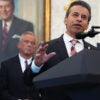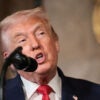In debating an updated NAFTA trade agreement, we should not lose sight of why we have these agreements and how we grow jobs and our economy.
Economic freedom and enhanced competitiveness are the drivers of such growth and should be top priorities in the negotiations.
In many corners of the popular culture, NAFTA has become somewhat of a scapegoat for America’s economic troubles. But as Anthony Kim and Ambassador Terry Miller of The Heritage Foundation explained in a recent report, “Counterintuitive as it may sound, America’s economic problems, including those attributed to trade, begin at home, not abroad.”
Instead of making it more difficult for U.S. companies to invest in Mexico or Canada, a “NAFTA upgrade” to U.S. economic policies can make companies want to invest and grow right here in the United States by:
- Rolling back regulations.
- Encouraging innovation.
- Adding incentives for companies to develop and maintain a 21st-century workforce.
- Fixing infrastructure.
Regulations and red tape should be rolled back wherever they stifle economic freedom or limit competitiveness. Too many regulations restrict business owners from expanding their businesses.
The U.S. government should take care not to favor certain companies or industries. This will allow innovation to pay off without making innovators compete with government-supported winners—or be propped up themselves by government, taking away their hunger and drive to innovate in the process.
Our economy needs new incentives to develop an American workforce that has skills the 21st-century job market demands.
This can be done, for example, by enhancing workforce mobility so that graduates of apprenticeship programs at community colleges can cross borders—whether international or among the states—with ease, and by ending government-required occupational licensure when it inhibits economic freedom and prevents entrepreneurs from launching businesses.
Finally, instead of putting trade barriers up on our neighbors to the north and south with tariffs, rules of origin, and trade remedies, the U.S. should instead embrace free enterprise to drive investment in physical and digital infrastructure to strengthen our economies, make trade more cost-efficient, and make travel more effortless within and across our borders.
Modernizing our infrastructure will increase wages for American workers, and reduce the costs of goods and services for families, thus increasing their economic freedom by opening brand new opportunities for them with the money they save.
Upgrading U.S. policies in these four ways would lead to increases in economic freedom for all Americans, and increase Americans’ ability to take advantage of the opportunities NAFTA offers. It would also stop the government interference that makes us less competitive on the world stage.
It is time to do the things we know work, enhance economic freedom, and let companies compete on their own merits. With government enabling their successes rather than their failures, American companies will be good enough to outperform any competitor.
































